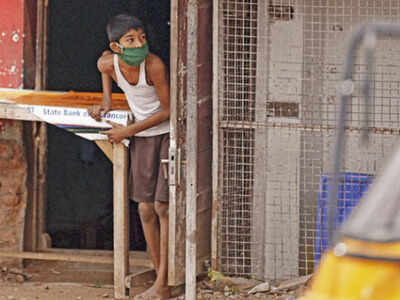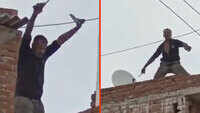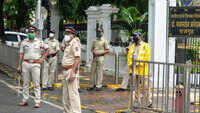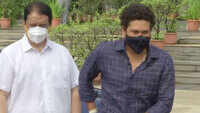
THIRUVANANTHAPURAM: Four months after the first Covid case was reported in the capital, the district has broken the paradox of primary cases causing no transmission or not spreading beyond the family of an index case. Primary cases known as ‘dead ends’ (where a good percentage did not infect anyone else) have now given way to ‘broad ways’ in the district; said an infectious disease expert.
Covid-19 has now taken off in the capital with more than one super spreading event suspected at Poonthura – where cases threaten to cross 200 – and formation of linked and unlinked clusters in rural and urban areas. Disease investigators – who now believe that super spreading events would have resulted in transmission of infection to over 20 persons/case – say that Poonthura’s low dispersion factor (k – how evenly a disease spreads) could still give much-needed time for containment. Studies show that for Covid-19, the value of k is as low as 0.1and around 10% cases lead to 80% of the spread. "Covid behaves heterogeneously in populations; not everyone will transmit the disease equally. Outbreak happens because of super spreading events. Delayed outbreak could give us some time. Clustering effect happens because of super spreading and it could be more than one event. So when ‘k’ value is less, the factors which led to super spreading events should be rightly understood and activities shall be taken to curtail the event," said an epidemiologist.
"At Poonthura, uncontrolled social interaction without distancing protocol might have resulted in larger spread. That’s why we bring an entire area under control to ensure social distancing,’’ the epidemiologist added. While super spreading events at Poonthura were not preceded by a major event like a choir or orchestrated public gathering as in South Korea or Washington, an article published in Science magazine shows that timing and situation are crucial in super spreading events. It says that a person, who is highly infectious for a specific period, enters a highrisk setting and triggers a superspreading event. If that person does the same thing 2-3 days later, the effect will be different. Dense population in Poonthura and link of infected persons to Kumarichantha could have set off super spreading events.
The formation of multiple clusters at Parassala, Vallakadavu, Poonthura and Aryanadu is perceived as enough indications of limited community spread happening in the district. "It’s important to know exactly how many index cases are causing the transmission in different areas. We still don’t know whether they were associated with a common event or not. Such factors can only be known through effective contact tracing," said Dr Rakhal Gaitonde at Achutha Menon Centre for Health Science Studies.
Covid-19 has now taken off in the capital with more than one super spreading event suspected at Poonthura – where cases threaten to cross 200 – and formation of linked and unlinked clusters in rural and urban areas. Disease investigators – who now believe that super spreading events would have resulted in transmission of infection to over 20 persons/case – say that Poonthura’s low dispersion factor (k – how evenly a disease spreads) could still give much-needed time for containment. Studies show that for Covid-19, the value of k is as low as 0.1and around 10% cases lead to 80% of the spread. "Covid behaves heterogeneously in populations; not everyone will transmit the disease equally. Outbreak happens because of super spreading events. Delayed outbreak could give us some time. Clustering effect happens because of super spreading and it could be more than one event. So when ‘k’ value is less, the factors which led to super spreading events should be rightly understood and activities shall be taken to curtail the event," said an epidemiologist.
"At Poonthura, uncontrolled social interaction without distancing protocol might have resulted in larger spread. That’s why we bring an entire area under control to ensure social distancing,’’ the epidemiologist added. While super spreading events at Poonthura were not preceded by a major event like a choir or orchestrated public gathering as in South Korea or Washington, an article published in Science magazine shows that timing and situation are crucial in super spreading events. It says that a person, who is highly infectious for a specific period, enters a highrisk setting and triggers a superspreading event. If that person does the same thing 2-3 days later, the effect will be different. Dense population in Poonthura and link of infected persons to Kumarichantha could have set off super spreading events.
The formation of multiple clusters at Parassala, Vallakadavu, Poonthura and Aryanadu is perceived as enough indications of limited community spread happening in the district. "It’s important to know exactly how many index cases are causing the transmission in different areas. We still don’t know whether they were associated with a common event or not. Such factors can only be known through effective contact tracing," said Dr Rakhal Gaitonde at Achutha Menon Centre for Health Science Studies.
Quick Links
Kerala Coronavirus Helpline NumberHaryana Coronavirus Helpline NumberUP Coronavirus Helpline NumberBareilly NewsBhopal NewsCoronavirus in DelhiCoronavirus in HyderabadCoronavirus in IndiaCoronavirus symptomsCoronavirusRajasthan Coronavirus Helpline NumberAditya ThackerayShiv SenaFire in MumbaiAP Coronavirus Helpline NumberArvind KejriwalJammu Kashmir Coronavirus Helpline NumberSrinagar encounter
Get the app








